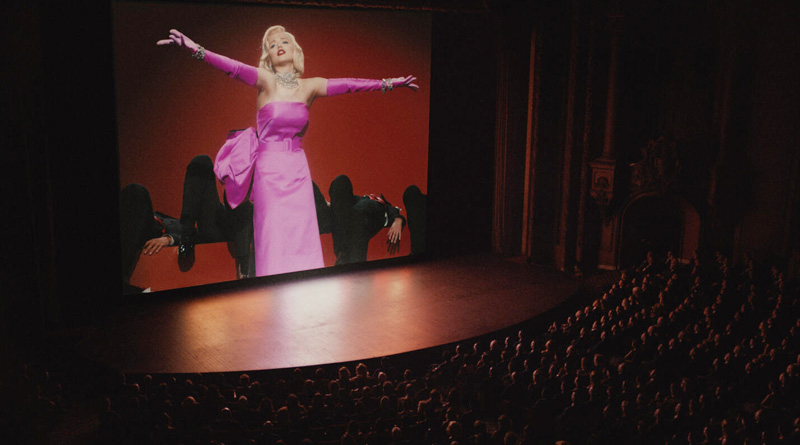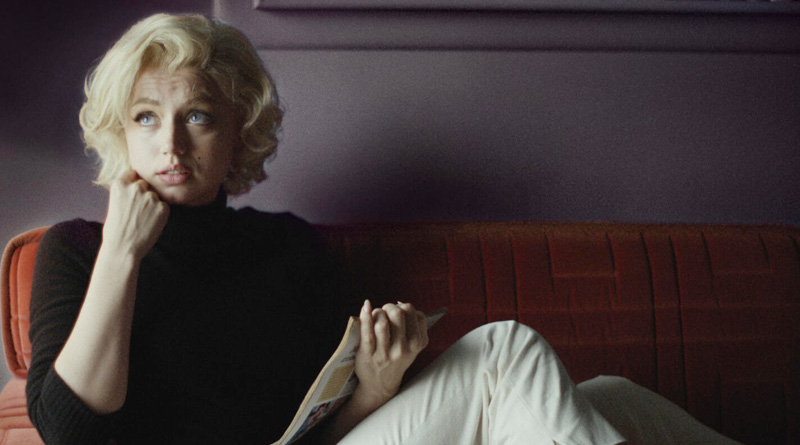Blonde (2022) Review
It’s not every day that we get a movie that carries the most restrictive rating of NC-17. The last time I watched an NC-17 movie was the Palme d’Or-winning romance drama, Blue Is the Warmest Colour back in 2013. Blonde is the latest movie with such a rating and even made history as the first NC-17-rated streaming release.
Writer-director Andrew Dominik, whose last feature film was the Brad Pitt-starred Killing Them Softly (2012), doesn’t shy away from the sexually explicit content that earned his passion project (he reportedly tried to get Blonde off the ground as early as 2010) about Marilyn Monroe the aforementioned adults-only rating. It’s worth noting that Blonde is not a traditional biopic but more of a fictionalised take on the life of the legendary sex symbol. Besides, Dominik adapted from Joyce Carol Oates’ 2000 Pulitzer Prize finalist novel of the same name, is also a work of fiction itself.
Throughout the movie, we learn how Marilyn (Ana de Armas) is being sexually exploited by some of the men both professionally and personally. She earns her “big break” in Hollywood after a studio executive (David Warshofsky) raped her in his office. She also has a three-way relationship with Cass Chaplin (Xavier Samuel) and Eddy Robinson Jr. (Evan Williams), both respective sons of Hollywood screen legends Charlie Chaplin and Edward G. Robinson. Then, in 1962, she is escorted by Secret Service agents to meet the president (that would be JFK but the movie merely credited Caspar Phillipson’s role as “The President”) in the hotel room. This leads to one of the most controversial sex scenes in the movie.

The scenes mentioned in the paragraph above are all fictionalised for dramatisation purposes. Blonde may have been fiction and should be treated as such. But then again, seeing an iconic sex symbol like Marilyn Monroe being reduced to a victim of sexual assault feels as if the movie prefers to humiliate the subject as degrading as possible. It’s almost like Dominik sneakily making a porn version of fictionalised Marilyn Monroe minus the X-rated content.
Which is a pity, considering Ana de Armas’ performance as Marilyn Monroe is her best one to date. She gives her all in Blonde, beginning with her physical transformation (including her iconic platinum-blonde short curls) that made Ana de Armas look identical to the late Monroe. She also successfully captured the star’s signature breathy voice, even though her Cuban accent can still be heard in some scenes. But it’s forgivable, thanks to her magnetic charm and movie-star quality. Her acting is memorable enough that she deserves to be recognised come awards season.
But what she doesn’t deserve is an overall story that feels like cheap exploitation. And it’s an overlong story too. A rather punishing length of 166 minutes (that’s 2 hours and 46 minutes!) that could seriously use some tighter edits. There are times that Blonde feels like a self-indulgent excess, even though it’s hard to deny that Dominik has a knack for shooting some of his scenes beautifully. With the help of cinematographer Chayse Irvin, the movie excels in its stunning visual aesthetics that alternate from the well-saturated Technicolor to the atmospheric black-and-white, complete with the way different aspect ratios are brilliantly used in certain scenes. Dominik even deserves credit for perfectly recreating some of Monroe’s popular movie scenes, namely Gentlemen Prefer Blondes (1953), where Armas sings “Diamonds are a Girl’s Best Friend” in a pink dress and of course, the billowing-white-dress subway grate scene in The Seven Year Itch (1955).

Earlier in the movie, Blonde does begin promisingly with a sympathetic prologue detailing Norma Jeane’s (way before she was known as Marilyn Monroe) estranged childhood (Lily Fisher in a solid supporting turn as the younger version). She lives with her emotionally unstable single mother, Gladys (Julianne Nicholson, equally worth mentioning here). The movie also traces Marilyn’s subsequent relationships with two different men (other than Cass and Eddy) including the “Ex-Athlete” (Bobby Cannavale, obviously playing a stand-in character of Joe DiMaggio) and “The Playwright” a.k.a. Arthur Miller (Adrien Brody), where she called them “daddy”. Both Cannavale and Brody deliver respectively decent performances — one is volatile and physically abusive while the other is a tender-hearted gentleman.
So much for the long-anticipated wait for Blonde. I was actually hoping this would end up in one of my Top 10 best movies of 2022 list but the result is rather an uneven effort that stuck between Ana de Armas’ award-worthy performance as well as Andrew Dominik’s visually arresting direction and the misguided, yet lengthy fictionalised version of Marilyn Monroe’s life.
Blonde is currently streaming on Netflix.





